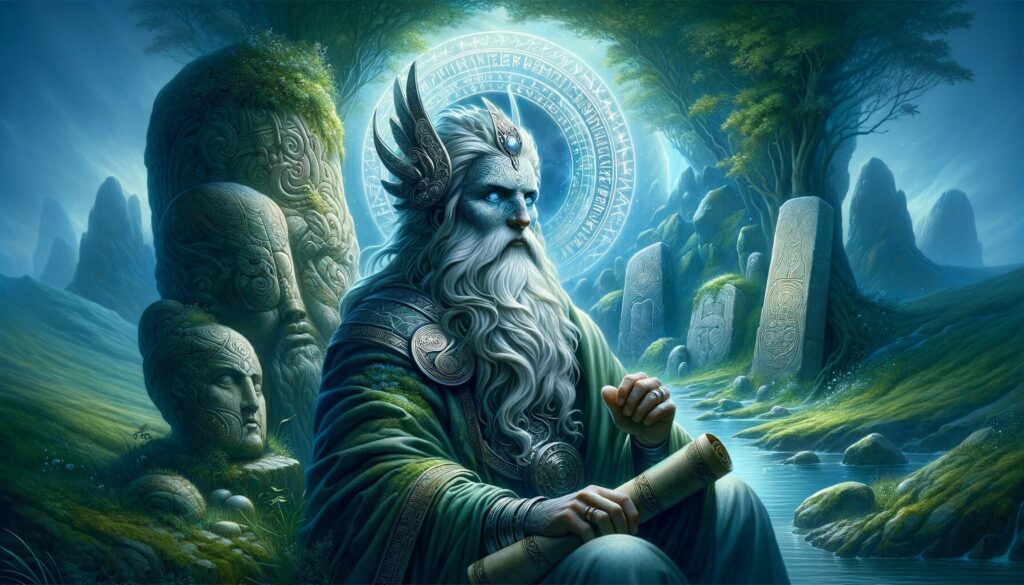Creatures in Norse mythology, Kvasir, Norse Mythology, Tales of the Gods
Kvasir: The Embodiment of Wisdom in Norse Myth
Introduction
Norse mythology is a rich tapestry of gods, goddesses, and mythical creatures that have captivated people’s imaginations for centuries. Within this intricate mythological framework are numerous characters and beings, each with unique attributes and significance. One such character that often remains in the shadows is Kvasir, the embodiment of wisdom and knowledge. In this article, we will delve deep into the world of Kvasir, exploring his origin, his role in Norse mythology, and the lessons we can draw from his story.
The Birth of Kvasir
Kvasir’s story begins with a peculiar event that took place in the aftermath of the Aesir-Vanir war, a conflict between two groups of Norse gods. To cement their newfound alliance, the Aesir and Vanir gods decided to create a symbol of unity – Kvasir. This creation was unlike any other being in Norse mythology, for Kvasir was not born of divine lineage but instead emerged from the intermingled saliva of the gods.
The gods gathered the divine saliva in a cauldron and shaped it into a being of extraordinary wisdom. Kvasir’s name itself is derived from the Old Norse word “kvas,” which means “fermented berry juice,” possibly signifying the transformative power of knowledge and wisdom.
The Wisdom of Kvasir
Kvasir’s most defining trait was his unparalleled wisdom and knowledge. It is said that there was no question he could not answer and no riddle he could not solve. This theoretical and practical wisdom made Kvasir a valuable asset to the Norse gods. His presence brought enlightenment and intellect to the divine realms.
The Mead of Poetry
One of the most famous tales involving Kvasir revolves around the creation of the Mead of Poetry, a beverage with the power to bestow poetic inspiration and wisdom upon those who consumed it. After Kvasir’s creation, he traveled through the realms, sharing his knowledge and wisdom with all he encountered. One day, he crossed paths with two dwarves named Fjalar and Galar.
The malevolent dwarves, envious of Kvasir’s wisdom, invited him to their dwelling. There, they treacherously murdered him and drained his blood into two vats and a pot. Mixing honey with his blood, they created the Mead of Poetry. This mead became highly sought after by both gods and mortals, for whoever drank it would gain the gift of poetry and unparalleled wisdom.
The Mead of Poetry’s Lasting Impact
The Quest for the Mead of Poetry
The creation of the Mead of Poetry set in motion a series of events that would involve gods, giants, and mortals alike. The quest for the mead became a central theme in Norse mythology. The cunning god Odin, eager to obtain the mead’s power, embarked on a daring journey to secure it.
Odin’s journey took him to the court of the giantess Gunnlod, who guarded the mead in a cave deep within a mountain. Using his wits and charm, Odin seduced Gunnlod and convinced her to allow him access to the mead. Over three long nights, he drank all of it, transforming into an eagle to make his escape.
Kvasir’s Interactions with Other Gods and Beings
Kvasir’s Legacy
While Kvasir’s physical form was lost when the dwarves murdered him, his legacy endured through the Mead of Poetry. The mead’s transformative power spread throughout the realms, shaping the destiny of poets, scholars, and seekers of wisdom. Those who partook in the mead found their poetic talents enhanced and their minds filled with profound insights.
In a way, Kvasir’s sacrifice for the greater good of the cosmos underscores the importance of wisdom and knowledge in Norse mythology. His death and the creation of the Mead of Poetry represent the idea that wisdom can be attained through sacrifice and that knowledge is a treasure worth pursuing, even at great cost.
Lessons from Kvasir
Kvasir’s story carries several lessons and themes that resonate beyond the realm of mythology:
1. The Value of Wisdom
Kvasir’s existence exemplifies the value placed on wisdom in Norse culture. In a world where knowledge could be a source of power and influence, Kvasir’s wisdom was revered by gods and mortals alike. This highlights the timeless importance of knowledge and the recognition that true wisdom is a precious asset.
2. The Consequences of Envy
The actions of the envious dwarves, Fjalar and Galar, serve as a cautionary tale. Their jealousy led to treachery and murder, ultimately resulting in the creation of the Mead of Poetry. This story reminds us of the destructive power of envy and the consequences of letting such negative emotions guide our actions.
3. Sacrifice for a Greater Good
Kvasir’s selfless act of sharing his wisdom and the subsequent sacrifice of his life for the greater good demonstrate the theme of sacrifice in Norse mythology. His willingness to give all he had for the benefit of others serves as a reminder that, sometimes, personal sacrifices are necessary for the betterment of society and the world.
4. The Pursuit of Knowledge
Odin’s quest for the Mead of Poetry reflects the relentless pursuit of knowledge. His willingness to go to great lengths to acquire wisdom underscores the idea that knowledge is something to be actively sought and valued.
Conclusion
Kvasir, the embodiment of wisdom in Norse mythology, stands as a symbol of the importance of knowledge, the consequences of envy, and the willingness to make sacrifices for the greater good. His story, intertwined with the creation of the Mead of Poetry, continues to resonate with people today as a reminder of the enduring power of wisdom and the lengths some will go to acquire it. In a world filled with myths and legends, Kvasir’s legacy endures as a testament to the enduring pursuit of knowledge and the transformative power of wisdom.

